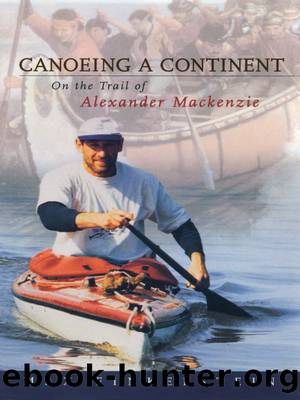Canoeing a Continent by Max Finkelstein

Author:Max Finkelstein
Language: eng
Format: epub
Tags: book, book
Publisher: Dundurn Press
Published: 2005-03-20T04:00:00+00:00
The upper Blackwater River carries us pasts several cattle ranches run by descendants of Pan Phillips and other adventurous pioneering cowboys. The rich natural meadows are home for the most contented cattle and horses we have ever seen.
âYou know,â I say to Chris, sipping my hot chocolate, âI remember about twenty-five years ago when I lived in British Columbia looking at the Blackwater River on a provincial map. The name West Road was written in brackets beside it. I remember thinking that sounded like such an interesting name, and it looked like an interesting river to paddle. Now here we are paddling down it. You just never know where life is going to take you. Or how itâs going to take you where it takes you. Like a river.â
Chris rolls another cigarette and says: âYa gotta dream, Max, and ya gotta follow some of those dreams, âcause ya just never know where theyâre going to take you.â
Boy, Chris is right about that.
Itâs not long before the Blackwater leaves behind the vast daisy- and dandelion-dotted meadows of dream-ranch country, and the forest of spruce and pine closes in. Moose, deer, and black bears replace the cattle and horses. Rocks and trees replace the weathered log fences.
The peaceful, meandering River begins to pick up speed and power. We pick our way through many rapids, adding only a few scratches to the bottom of the canoe. Not far above Tsacha Lake, the Blackwater begins to cut a deep canyon through the black basalt bedrock, culminating in a 12-m (40-foot) falls, where the river plummets over a vertical rock face in a curtain of white. Below the falls, trout almost a metre long are leaping, trying to swim up this impossible barrier.
âItâs just like popcorn popping,â says Chris. âI wonder why they keep trying to get up this thing, when itâs clearly impossible? They remind me of me sometimes.â
As we paddle the last quiet stretch of river through the wetlands above Tsacha Lake, a cow moose with two calves wades across in front of us. Around the next bend, another cow with two calves watches, unconcerned, as we paddle by. Moose were unknown in the Blackwater watershed until 1897, when Old Chief Morris of Kluskus shot the first one ever seen here, according to local lore. Not knowing the species, the local Carrier were reluctant to eat it. By the 1930s, when Phillips and Hobson were driving in cattle, moose were abundant. The cowboys lived on moose and dressed in moose skin, but the Carrier still preferred to eat caribou, their traditional mainstay.
For centuries, woodland caribou had been the most common ungulate in this region. They need large tracts of undisturbed forest for the lichens that they depend on, particularly in winter. These lichens, which grow very slowly, hang in grey-green strings from the branches of old-growth conifers. Moose, in contrast, thrive in forests recently disturbed by fire or logging. Perhaps a series of forest fires created ideal habitat for them and destroyed the old conifers preferred by the caribou.
Download
This site does not store any files on its server. We only index and link to content provided by other sites. Please contact the content providers to delete copyright contents if any and email us, we'll remove relevant links or contents immediately.
Annapurna by Maurice Herzog(3272)
Liar's Poker by Michael Lewis(3193)
A Forest Journey by John Perlin(2887)
Atlas Obscura by Joshua Foer(2682)
The Ogre by Doug Scott(2479)
Cuba by Lonely Planet(2471)
Photographic Guide to the Birds of Indonesia by Strange Morten;(2382)
Tokyo by Rob Goss(2275)
All Things Reconsidered by Bill Thompson III(2244)
The Splendid and the Vile by Erik Larson(2201)
A TIME OF GIFTS by Patrick Leigh Fermor(2084)
INTO THE WILD by Jon Krakauer(2062)
Fatal Storm by Rob Mundle(2057)
DK Eyewitness Top 10 Travel Guides Orlando by DK(2034)
Trail Magic by Trevelyan Quest Edwards & Hazel Edwards(2033)
Abbey in America by Murray John A(2006)
Top 10 Dubai and Abu Dhabi by DK Travel(1965)
Touching the Void by Joe Simpson(1963)
Lonely Planet Australia by Lonely Planet(1950)
